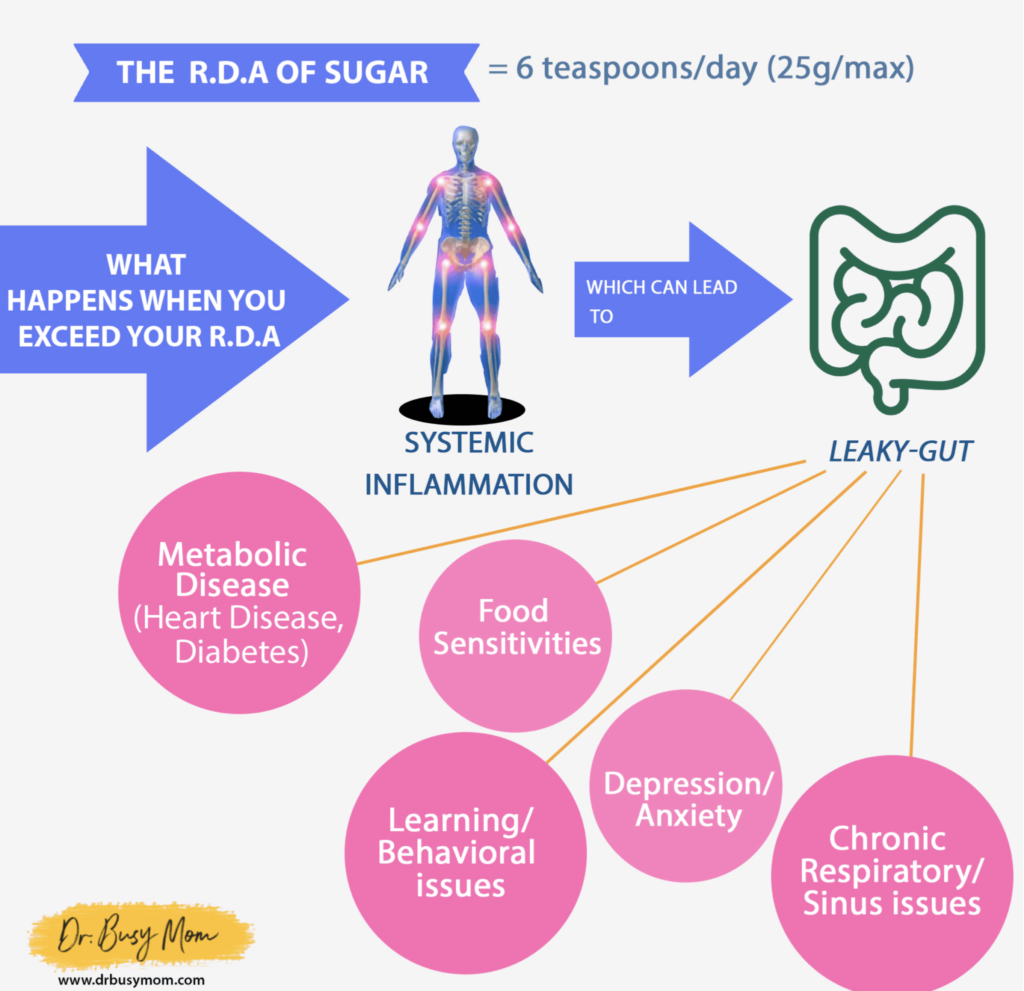Did you know that it in the year 1700, the average individual consumed about 4 pounds of sugar each year. In 1800, it was about 18 pounds of sugar per year. In 1900, the average person ate 90 pounds of sugar per year (1). Today, the average American consumes almost 152 pounds of sugar in one year. This is equal to 3 pounds (or 6 cups) of sugar consumed in one week. (2)
Before we dive into what happens in the human body upon exceeding our Recommended Daily Allowance (R.D.A.) of sugar, let’s review some typical foods we eat, and foods we may feed our kids to determine if sugar is problematic in your household.
Calculating Sugar in the Foods We Eat
According to the American Heart Association, the R.D.A. of sugar consumption is 6 teaspoons (or 25 grams). Let’s keep this in mind as we review some typical foods consumed in the average American household (3):
- One serving of breakfast cereal is approximately ¾ cup and contains 2.2 teaspoons of sugar
- One squeeze pouch of yogurt contains approximately 2.5 teaspoons of sugar
- One granola bar contains approximately 3 teaspoons of sugar
- One 12 ounce lemon-lime soda contains 9 teaspoons of sugar
- One 32 ounce sports drink contains 9 teaspoons of sugar
How Excess Sugar Impacts the Body
Whether you’re aged 2 to 17 or you’re an adult, your dietary level of sugar maxes out on a daily basis at 6 teaspoons which is about 25 grams. So if you or your child starts their day with a couple of bowls of cereal, they’re probably reaching their level of dietary sugar smack dab in the morning so anything consumed after that is going to be “excess.” In my opinion, this is where we run into problems.
The human body has an auto-immune-like response to the presence of excess sugar. Inflammation (swelling) occurs at the cellular level, followed by mucus production, as a defense mechanism. Remember that seventy or more percent of your immune system lies within your gut, so when you exceed your R.D.A. of sugar on a regular basis, you are assaulting your digestive tract and perpetuating inflammation and mucus production. Sugar intake is extremely important to look at if you are someone suffering from chronic sinusitis or chronic bronchitis to determine if your persistent mucus production is the result of intestinal inflammation. In fact, in my functional diagnostic medicine practice, sugar is such an important food to eliminate when we are trying to achieve a more sustainable, higher level of health. Contact me if you want to take a look at your health and determine if sugar is a problem for you.
Sugar as a Leading Cause of Metabolic Syndrome
Upon consuming too much sugar, the cells of the digestive tract become inflamed leaving you with a “leaky-gut.” Prolonged intestinal inflammation is the precursor to many metabolic syndromes like high blood pressure, high cholesterol and degenerative joint disease. Sugar inflames the linings of the arteries to the heart, increasing the risk of stroke and heart attack while also pumping inflammatory cytokines into your bloodstream which can exacerbate arthritis.(4)

Plant-based Sugar Alternatives
If you are reading this and you are contemplating avoiding sugar, yet you don’t know what to put in your coffee tomorrow morning, I’ve got you covered. I love stevia because I am a sucralose (Splenda) convert. I like the taste of stevia because it gives me that similar taste and the beauty is that it’s ten thousand times sweeter than sugar so a little stevia goes a long way. My husband uses raw, local honey in his coffee instead of sugar and has for years.
When it comes to baking I just love using coconut sugar in any recipe that calls for brown sugar. It’s an easy 1:1 conversion lending a nice caramel flavor to my cookies and cupcakes. But when only “real sugar” will do I always have raw organic turbinado sugar on hand. It’s an unrefined sugar that maintains its shape (doesn’t melt and mix into most batters) so it works well in recipes like fruit crisp where you are looking for a crunchy coating.
Is Sugar Problematic for Me?
If you are suffering from any chronic health issue, it’s always a good idea to revisit what you are eating on a daily basis. In my practice, it’s not so much the obvious “white sugar” that my patients need to avoid, it’s all of the other places that sugar hides in processed food, fast food and convenience foods. I can help you determine if sugar in your diet is keeping you from living your best life. Contact me HERE to find out more.


Recent Comments